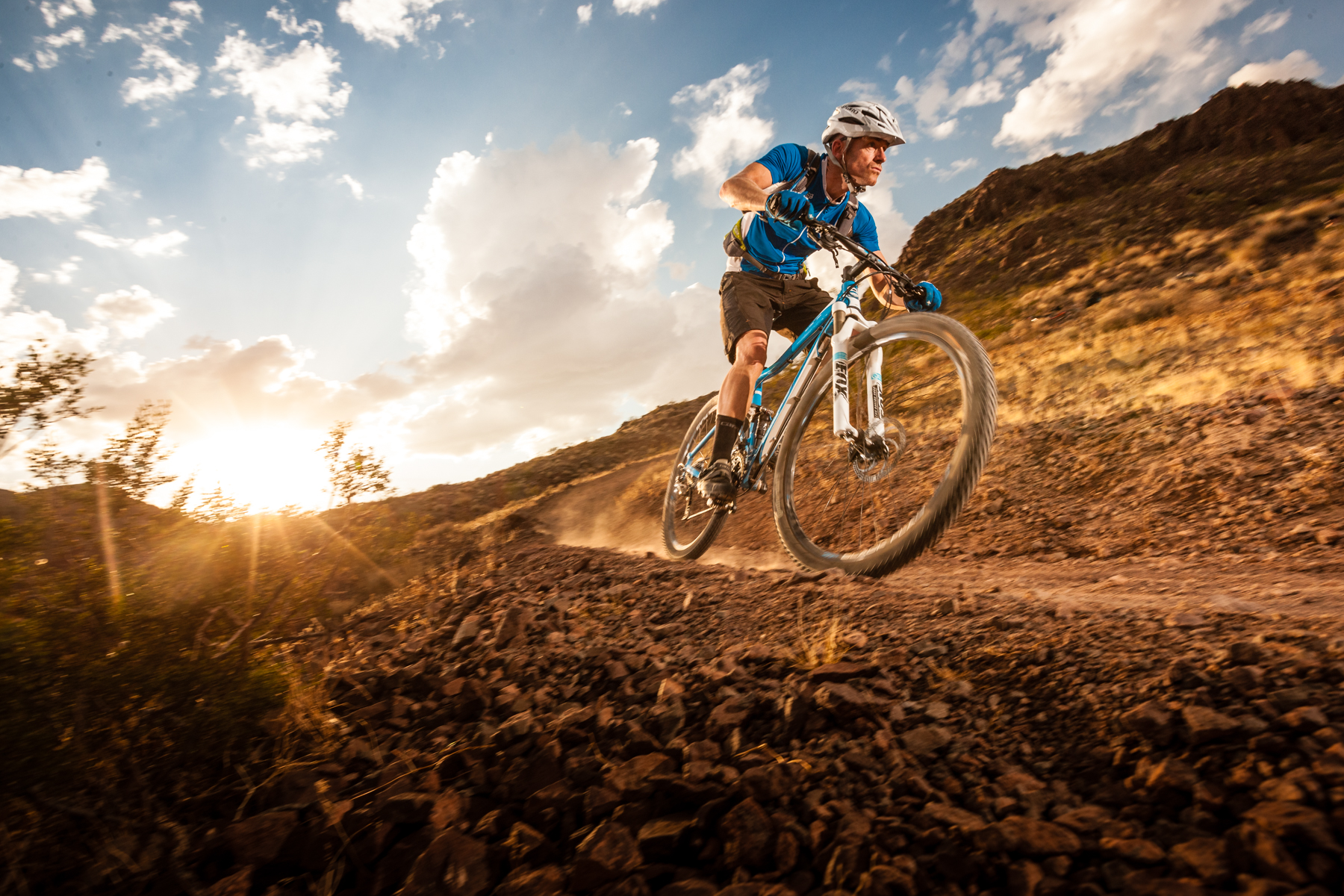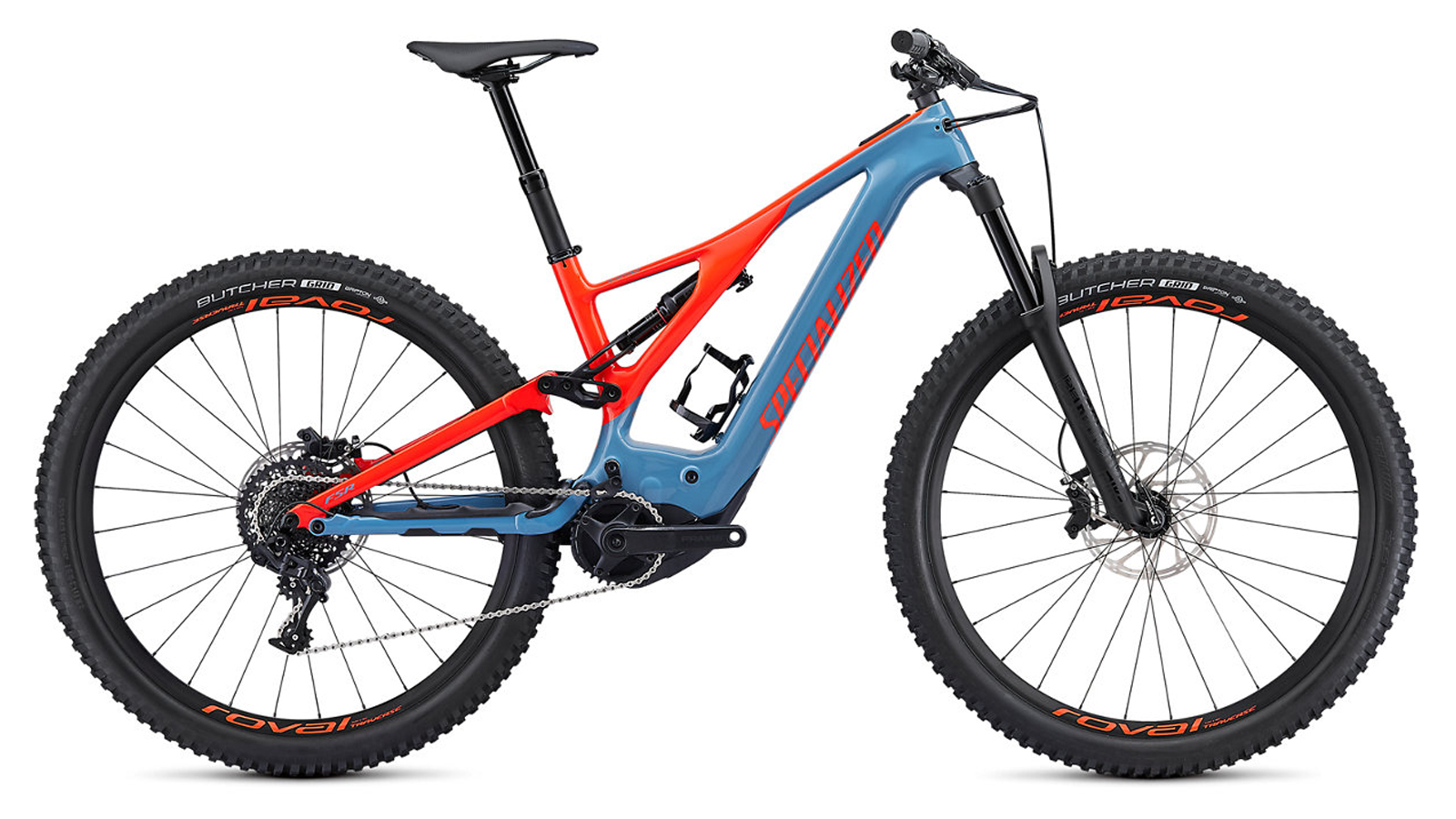Bike Perfect Verdict
Specialized’s benchmark-setting trail e-MTB gets battery boost and better sealing but carbon is a costly option
Pros
- +
Powerful, quiet and proven motor
- +
Massive battery
- +
Neat controls/app and excellent back up
- +
Well balanced all round trail riding geometry with neutral set-and-forget suspension
Cons
- -
Deserves tougher wheels and a fancier fork for the money
- -
Carbon frame is impressively light but makes it expensive
Why trust BikePerfect
Whether it’s the neat, structurally super-smart looks, low weight, quiet motor or easy app integration and excellent Specialized back up, Turbo Levo is the benchmark all other e-MTBs are judged against. But what do you need to know to work out if it’s the one for you as it rolls into its second year?
Design and geometry
The carbon front, alloy rear chassis of the Expert doesn’t change for 2020 but that’s no surprise as Specialized had already established a big lead over the competition in 2019. They dropped 400g out of the frame over the original Levo and then remodelled the motor with a smaller, direct-mount magnesium casing to drop another 400 grams.
The carbon frame is 600-700g lighter than the alloy version so even with a 700Wh battery as standard it’s still impressively light and ahead of the new 625Wh Bosch bikes on capacity. It’s a proper ‘in tube’ rather than cutaway gutter set up, sliding out easily for indoor recharging if needed. In fact, the whole installation looks really neat with only the bulbous bottom bracket area and battery indicator/switchgear panel behind the stem showing it’s an e-MTB.
The rest of the frame carries over the asymmetric strut design of the Stumpjumper for easy shock access and decent frame stiffness. The 150mm travel FSR suspension layout is the same too, including the ManFu direct shock link onto the short seat-tube-mounted rocker. You get the same chain quietening ‘rubber rampart’ stay protection and Specialized has now made its own cover for the previously filth-and-junk-hungry hole behind the motor.
In terms of handling the Levo's geometry is actually more aggressive than the Stumpjumper, with a 0.5-degree slacker head angle (66-degrees), 0.5-degree steeper seat tube (74.5-degree) and 10mm more reach.
Components and build
The Levo Expert sticks with a conventional rather than short offset version of Fox’s 36 fork and it’s a relatively basic Performance model rather than something smarter and more tuneable but it’s good to have the stiff legs to handle the extra bike mass.
Already powerful SRAM Code R brakes get 200mm rotors both ends for extra anchorage and heat dissipation on long descents. For 2020 you also get an Eliminator rear tyre using a full DH spec BLCK DMND casing to survive the heavier impacts - and often higher speeds - of e-bike life. The front Butcher tyre uses an intermediate Grid carcass but both ends are 29 x 2.6in for big, easy rolling air volume.
SRAM’s single click trigger eliminates multi shift chain strain and the 32 tooth chainring is steel for maximum wear life. Praxis crank arms are stiff, with a 165mm length for extra ground clearance and easy spin rather than peak grunt. Interestingly Specialized has stuck with a 10-42 11-speed cassette and mechs rather than going full Eagle MTB groupset, relying on the motor to make up the difference in ultra-steep situations.
All sizes of 2020 Levo now get the 40mm stem reserved for smaller bikes in 2019, with a 780mm handlebar for leverage. We love the fact Specialized includes its pop-up SWAT trail tool in the head tube, although there’s obviously no room for the SWAT down tube storage seen on the carbon non e-bikes. Specialized’s slightly primitive Command Post dropper is size specific in shaft length and so are the grips and saddle.
While the DT-based components are okay, it’s worth noting the wheel build quality wasn’t great on 2019 bikes with spokes loosening and wheelsets going soft under the extra torque. That’s something you can get checked over and tweaked before you even leave the shop but only having 28 spokes front and rear will always mean a lot of load on each wire, too. Ditch the inner tubes and turn the tyres tubeless (or get the shop to do it) before you even turn a pedal.
Ride, handling and performance
Specialized has a real knack of making bikes feeling welcoming straight away and that’s definitely one of the Levo’s real strengths. You’ve also got to remember that with the monster 180mm-travel Kenevo covering gravity duties, the Levo is deliberately designed as a trail bike. Specialized have factored in the extra weight that needs controlling on descents though and the slightly slacker and longer geometry than the Stumpjumper gives it more stability on descents or in slippery situations. While it’s only 10mm shorter the stem makes a noticeable difference in terms of reaction speed when lines need tweaking.
While it’s not as low slung and utterly planted as Whyte’s E-150 or other enduro-shaped machines you still feel planted so it’s easy to tip and turn rather than the battery weight heaving you high side in corners. It’s still alive enough to nip round tight singletrack turns and corner well on climbs. The steeper seat angle helps here too, although you still need to shift onto the saddle nose for poise compared to more progressively shaped machines.
The super-heavy duty rear tyre means you can run lower pressures for grip (in fact it’s pretty much essential to stop it feeling like wood) without compromising survival . The extra tyre float and diameter combines with the extra momentum of the bike and the boosted sprung to unsprung suspension ratio for a proper steamroller-effect over chatter and stutter sections. The fact you’ve got motor assistance hides the notion that FSR bikes can feel a bit mushy when pedalling. The Fox 36 gives decent accuracy and consistent up to a reasonably rowdy level but the overall suspension feel remains ‘comfort’ rather than ‘extreme control’ targeted. Given who we normally see riding Levos in the real world, that’s entirely appropriate though.
The overall character is bang on for it’s likely customers too, in that it can more than handle itself on tech, downhill sections but you don’t feel like you’re boring it if you’re just putting in the climbing meters between them or out for all-day kilometres making the most of the massive battery.
The motor and battery side of the Levo is generally a big plus compared to other bikes. For a start it’s been in the field for a year compared to the brand new Bosch motors appearing everywhere. That means while - like every motor and e-bike system - it has had issues, there’s more experience on solving them at local dealers. Specialized’s customer service is legendarily good and having seen a job advert for its UK warranty department last year we can confirm that getting you back on your bike ASAP is a priority the company takes extremely seriously and tracks fanatically from start to finish.
The motor itself is really good. It’s got an impressive 90Nm of torque (Bosch is 75Nm) that comes in over a broad cadence range and is totally drag free when you overtake its speed limit. While it’s noisier than the original Brose-powered Levo, primary belt drive means it’s still quiet compared to most of its peers. Having the big battery as standard also makes 100km rides possible even on taxing terrain.
Verdict
There are certainly a lot more really good e-MTB options rolling out for 2020 including some properly rad handling rides and slicker integrated, bigger battery, new Bosch-powered machines. Specialized has obviously taken lessons from 2019 to add genuinely useful component tweaks for 2020 and made the Carbon Expert an even better all rounder than before.
Its bespoke motor and battery approach still gives it an edge in terms of power and/or range, plus the reassurance of a proven system and excellent support network. If we had to nitpick we’d prefer better-built, more spoke-rich wheels and a shorter offset, more advanced fork. We’d potentially size up for more reach too if you want a more stable, speed happy handling feel.
While the weight saving over the alloy frame is impressive on its own, it’s less significant in terms of overall bike mass and makes the Carbon an expensive option. That means while the Expert Carbon is an excellent e-allrounder, the alloy Comp, which now gets the 700Wh battery and a beefy RockShox Lyrik fork (2019 bikes had a 500Wh battery and a skinnier Revelation fork) for £1750 less than the Expert Carbon, looks like the obvious value sweet spot of the Levo range.
Test conditions
- Temperature: 5-15 degrees in dry and wet weather, day and night
- Trails: Machine-built trails, man-made and natural
- Terrain: Blue, red and black graded trail centre and a mix of easy to difficult natural terrain
Tech Spec: Specialized Turbo Levo Expert Carbon
- Price: £5799.99
- Head angle: 66-degrees
- Frame material: 9M carbon mainframe, M5 alloy rear end
- Size: Large
- Weight: 21.25kg
- Wheel size: 29-inch
- Suspension (front/rear): Fox 36 Performance 150mm travel, 51mm offset/Fox Float
- DPS 52.5mm stroke 150mm travel
- Drivetrain: SRAM X1 10-42T 11 speed gearing with S700 shifter. Praxis 32T chainset
- Brakes: SRAM Code R brakes with 200mm rotors
- Tyres: Specialized Butcher Grid front, Eliminator BLCK DMND 29 x 2.6in rear
- Wheels: Roval Traverse 29 rims with DT Swiss (Competition Race spokes, Specialized front hub, DT Swiss 360 rear hub)
- Bar/stem: Specialized Trail 780x31.8mm bar and 40x31.8mm stem
- Seatpost: Specialized Command IRcc 160mm dropper post
- Saddle: Specialized Bridge 143mm saddle

Guy Kesteven has been working on Bike Perfect since its launch in 2019. He started writing and testing for bike mags in 1996. Since then he’s written several million words about several thousand test bikes and a ridiculous amount of riding gear. He’s also penned a handful of bike-related books and he reviews MTBs over on YouTube.
Current rides: Cervelo ZFS-5, Specialized Chisel, custom Nicolai enduro tandem, Landescape/Swallow custom gravel tandem
Height: 180cm
Weight: 69kg

